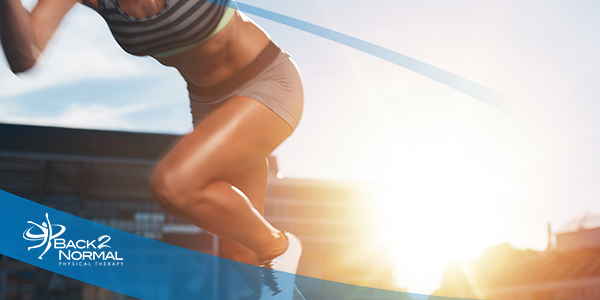
The ultimate athlete is built for speed, endurance and peak performance with movement efficiencies, ideal recovery and minimal risk for injury. To achieve success, athletes at all levels must have the drive and the commitment to train hard but, more importantly, train and recover smart. Building a solid plan and having the right team of people will not only make a difference in your performance, but will also give you the edge over your competitors.
Visualize, Commit, Execute
Before you can even plan for peak performance, you have to start with a vision of where you want to go and then build a solid foundation. Whether you want to complete a marathon, get a college athletic scholarship or win a title at Wimbledon, setting your goals is the first step to building a plan. Next, you must commit to do whatever it takes to succeed and stay healthy. Lastly, select your team carefully. As an athlete you must take responsibility for your journey and not only hold yourself accountable, but also the team of people around you.
Build Your Team
Surround yourself with people who believe in you and have a strong commitment to help you achieve your goals. Each member can play a specific role in your success, so choose wisely. Make sure that whomever you select has proper credentials, specific expertise and experience working with athletes at the appropriate level you need to succeed. Take time to talk to other athletes, interview candidates and do your research.
Start with the fundamentals and identify your weak link.
Sound Movement Patterns
Fundamental movements are the building blocks for strength, endurance, speed, power and agility. If an athlete does not move well, over time the body learns to compensate, causing microtrauma to joints and muscles. This may not initially affect performance but eventually you will experience breakdown, inconsistencies, loss of power, fatigue, recurrent soreness and, ultimately, injury. Working with an expert such as a physical therapist or strength and conditioning specialist will help set the framework to maximize your training efforts and direct your focus.
Solid Physical Conditioning
Work with an athletic trainer or strength and conditioning expert to assess areas such as strength, power, speed, agility, coordination, balance and endurance and then figure out the best strategies to create a balanced foundation.
Proper Skill & Technique
Many factors should be considered to assess your skill and technique such as sport specific testing, competition statistics and technique analysis to help identify areas of concern. Working with a skilled coach who understands the demands and fundamental aspects of your sport will be paramount to your success.
Competition & Training Schedule
Athletes train and compete throughout the year and target different periods of physical training and sports skill to peak their performance during competition events. Use training diaries and a journal to help build a sustainable schedule and identify appropriate training and recovery periods.
Select the Best Equipment
Equipment can range from clothing, shoes, orthotics, sunglasses, bracing and taping to specific sports gear such as a racquet. Work with experts and your coach to help identify the best equipment to support your athletic performance and minimize injury.
Know Your Environment
Preparing for extreme weather conditions, adjusting equipment to support surface changes and bringing key items to support your training while on the road can all be helpful during training and competition events.
Ideal Nutrition & Hydration
Athletes require the right amount of nutrients to support their training, maximize their recovery and help repair their bodies to support a long career and consistent performance. To identify your specific health, nutrition, and sports needs, consider working with our Integrative Functional Nutritionist.
Adequate Warm-Up & Recovery
Prepare your body by performing exercises that mimic the movements needed for your sport such as a dynamic warm up. After practice, training and competition don’t skip your cool down. Perform a few dynamic movements, cardio cool down and static stretch key muscles used during your sport activity. You can aid and soothe muscle recovery with ice, hot/cold shower, Epsom salt soak, compression garments, Deep Blue dōTERRA essential oil, MELT method, restorative yoga or a massage.
Sound Sleep: Rest, Repair, Rebuild
Seasoned athletes get seven to nine hours of sleep, travel with their favorite pillow, meditate before going to bed, turn off electronics two to three hours before bedtime or use dōTERRA essential oils such as lavender to aid in a good night’s sleep.
Minimize Stress
Managing performance expectations, training loads, schedules, travel, family obligations, competition readiness and media and sponsor requests are just a few areas that can impact an athlete and cause stress. To minimize stress, try restorative yoga and meditation, a dōTERRA ARōMATOUCH essential oil treatment, build a healthy schedule, prioritize your efforts, get adequate rest and, if needed, work with a sports psychologist to target specific areas.
Maintain Health
Don’t let an injury or health issues sideline you from training and competition. Be proactive to address issues before they become a problem. Work with medical and health professionals such as a physical therapist, athletic trainer, acupuncturist, chiropractor or medical doctor to help identify areas of concern and come up with solutions to prevent injuries or illnesses before they happen.
So, what are you waiting for? It’s time for peak performance; are you ready? Seek advisement with our specialists, and let us guide you with the most effective practices for your unique needs! We offer a wellness-focused & supportive environment that can help you achieve your goals. Be sure to check our social media and blog updates for regular wellness inspiration, information, offers, and support.
Contributing Author: Lisa Chase, PT, CFMM, OMPT, Astym Certified
The Back 2 Normal blog is an educational resource written by Back 2 Normal employees and professional associates. Back 2 Normal bloggers are professionals who abide by the code of ethics outlined by their respective professional associations. The content published in blog posts represents the opinion of the individual author based on their expertise and experience. The content provided in this blog is for informational purposes only, does not constitute medical advice and should not be relied on for making personal health decisions.






